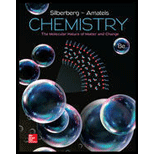
(a)
Interpretation:
The
Concept Introduction:
Acidity of oxides:
Oxide of metals are basic and oxide of non-metals are acidic but the bond bet ween covalent metal-oxide become covalent means they are act as an amphoteric
(b)
Interpretation:
The
Concept Introduction:
Acidity of oxides:
Oxide of metals are basic and oxide of non-metals are acidic but the bond bet ween covalent metal-oxide become covalent means they are act as an amphoteric
(c)
Interpretation:
The
Concept Introduction:
Acidity of oxides:
Oxide of metals are basic and oxide of non-metals are acidic but the bond bet ween covalent metal-oxide become covalent means they are act as an amphoteric
(d)
Interpretation:
The
Concept Introduction:
Acidity of oxides:
Oxide of metals are basic and oxide of non-metals are acidic but the bond bet ween covalent metal-oxide become covalent means they are act as an amphoteric
(e)
Interpretation:
The
Concept Introduction:
Acidity of oxides:
Oxide of metals are basic and oxide of non-metals are acidic but the bond bet ween covalent metal-oxide become covalent means they are act as an amphoteric
Want to see the full answer?
Check out a sample textbook solution
Chapter 14 Solutions
Chemistry: The Molecular Nature of Matter and Change
 ChemistryChemistryISBN:9781305957404Author:Steven S. Zumdahl, Susan A. Zumdahl, Donald J. DeCostePublisher:Cengage Learning
ChemistryChemistryISBN:9781305957404Author:Steven S. Zumdahl, Susan A. Zumdahl, Donald J. DeCostePublisher:Cengage Learning ChemistryChemistryISBN:9781259911156Author:Raymond Chang Dr., Jason Overby ProfessorPublisher:McGraw-Hill Education
ChemistryChemistryISBN:9781259911156Author:Raymond Chang Dr., Jason Overby ProfessorPublisher:McGraw-Hill Education Principles of Instrumental AnalysisChemistryISBN:9781305577213Author:Douglas A. Skoog, F. James Holler, Stanley R. CrouchPublisher:Cengage Learning
Principles of Instrumental AnalysisChemistryISBN:9781305577213Author:Douglas A. Skoog, F. James Holler, Stanley R. CrouchPublisher:Cengage Learning Organic ChemistryChemistryISBN:9780078021558Author:Janice Gorzynski Smith Dr.Publisher:McGraw-Hill Education
Organic ChemistryChemistryISBN:9780078021558Author:Janice Gorzynski Smith Dr.Publisher:McGraw-Hill Education Chemistry: Principles and ReactionsChemistryISBN:9781305079373Author:William L. Masterton, Cecile N. HurleyPublisher:Cengage Learning
Chemistry: Principles and ReactionsChemistryISBN:9781305079373Author:William L. Masterton, Cecile N. HurleyPublisher:Cengage Learning Elementary Principles of Chemical Processes, Bind...ChemistryISBN:9781118431221Author:Richard M. Felder, Ronald W. Rousseau, Lisa G. BullardPublisher:WILEY
Elementary Principles of Chemical Processes, Bind...ChemistryISBN:9781118431221Author:Richard M. Felder, Ronald W. Rousseau, Lisa G. BullardPublisher:WILEY





